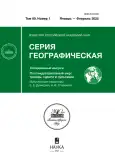Some Geographical Paradoxes of the Post-Industrial World
- Authors: Treivish A.I.1
-
Affiliations:
- Institute of Geography, Russian Academy of Sciences
- Issue: Vol 89, No 1 (2025): СПЕЦИАЛЬНЫЙ ВЫПУСК: ПОСТИНДУСТРИАЛЬНЫЙ МИР: ТРЕНДЫ, СДВИГИ И ПУЛЬСАЦИИ
- Pages: 49-60
- Section: Articles
- URL: https://journal-vniispk.ru/2587-5566/article/view/295117
- DOI: https://doi.org/10.31857/S2587556625010047
- EDN: https://elibrary.ru/CRUCTH
- ID: 295117
Cite item
Abstract
Paradoxes refer to the contradictions, real or supposed oddities and anomalies of post-industrial development, and its analysis at various geographical scales, from global to local. Apart from two paradoxes related to the looseness of the term itself, four more are examined, namely: (1) resources flow into activities, countries and regions with labor productivity that remains the same or drops and does not increase, like it did under industrialization; (2) the today’s world of knowledge and modernization is replete with false news, innovations, and sometimes shocking relapses of mass ignorance; (3) information is mobile and ubiquitous, while information and business actors settle selectively, in few countries, normally in large cities and their clusters; (4) areas requiring external assistance may be post-industrial “involuntarily” for the weakness of other economic sectors and development models. The article does not address all the post-industrial paradoxes observed at the global level and within countries. The judgment on their nature and its assessment depends on the level (scale). Paradoxes often just seem so, since they may have quite rational and explicable reasons. In addition, it can be difficult to separate post-industrial shifts and problems from their companions: globalization and deglobalization, the growth of human mobility, knowledge, technology and its barriers, urbanization and counter-urbanization, etc. This complicates the study of post-industrial phenomena as such and partly creates the identified paradoxes, but at the same time does not cancel the tasks of their scientific study.
Full Text
About the authors
A. I. Treivish
Institute of Geography, Russian Academy of Sciences
Author for correspondence.
Email: trene12@yandex.ru
Russian Federation, Moscow
References
- Armand A.D. Dva v odnom: Zakon dopolnitel’nosti [Two in One: The Law of Complementarity]. Moscow: LKI Publ., 2008. 360 p.
- Barone B., Bendini R. China: Economic outlook, 2015. European Parliament, 2015. 24 p.
- Broadberry S.N., Gupta B. Cotton Textiles and the Great Divergence: Lancashire, India and Shifting Competitive Advantage, 1600–1850. Discussion Paper no. 5183. Centre for Economic Policy Research, 2005. 50 p.
- Considerations upon the East India trade. London, 1701. 128 p. Available at: https://ia601200.us.archive.org/10/items/ConsiderationsUponTheEASTINDIATRADE/Considerations%20Upon%20the%20EAST-INDIA%20TRADE.pdf (accessed: 19.11.2024).
- Gallman R.E., Weiss T.J. The service industries in the nineteenth century. In Production and Productivity in the Service Industries. National Bureau of Economic Research, 1969, pp. 287–381.
- Gorkin A.P. Geografiya postindustrial’noi promyshlennosti [Geography of Post-Industrial Industry]. Smolensk: Oikumena Publ., 2012. 348 p.
- Gorkin A.P., Demidova E.E., Kadilova L.A. National wealth and territorially unlimited resources of the countries of the world. Reg. Issled., 2015, vol. 48, no. 2, pp. 148–152. (In Russ.).
- Milanovich B. Global inequality: From class to country of residence, from proletarians to migrants. Ekon. Politika, 2016, vol. 11, no. 1, pp. 14–26. (In Russ.).
- Sotsial’no-ekonomicheskaya geografiya: ponyatiya i terminy. Slovar’-spravochnik [Socioeconomic Geography: Concepts and Terms. Dictionary-Reference Book]. Gorkin A.P., Ed. Smolensk: Oikumena Publ., 2013. 328 p.
- Taleb N. The black swan: the impact of the highly improbable. New York: Random house, 2007. 366 p.
- Treivish A.I. Gorod, raion, strana i mir. Razvitie Rossii glazami stranoveda [Region, Country and the World: Development of Russia Viewed by a Regional Geographer]. Moscow: Novyi Khronograf Publ., 2009. 372 p.
- Treivish A.I. Novelty in science and life from the position of economic geographer. Reg. Issled., 2021, vol. 73, no. 3, pp. 88–99. (In Russ.).
Supplementary files















